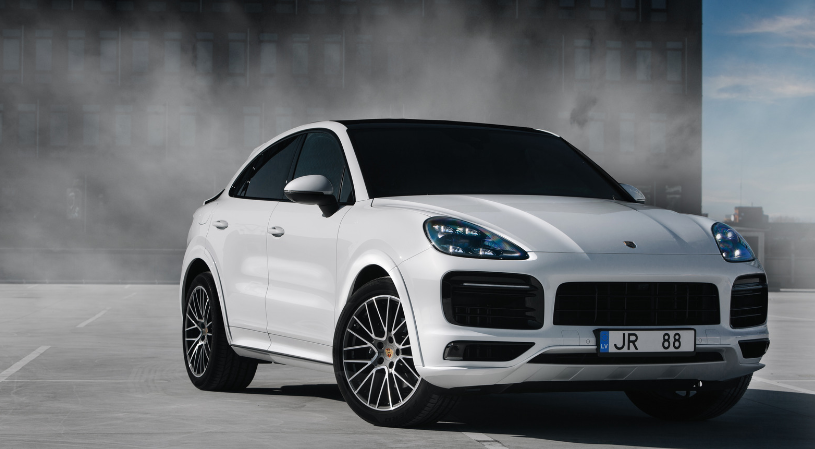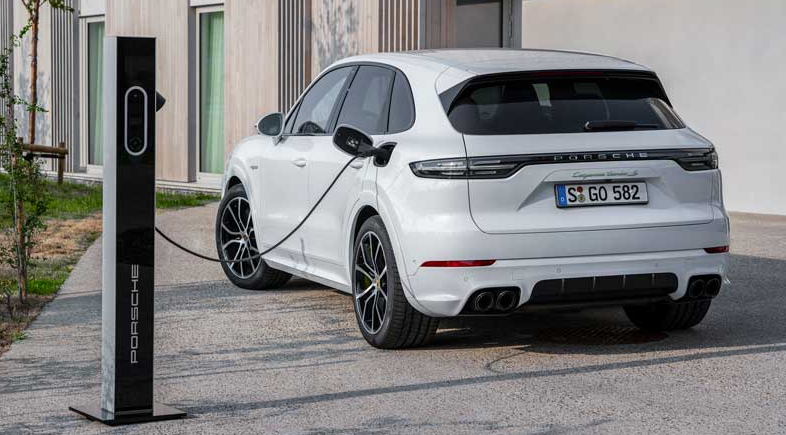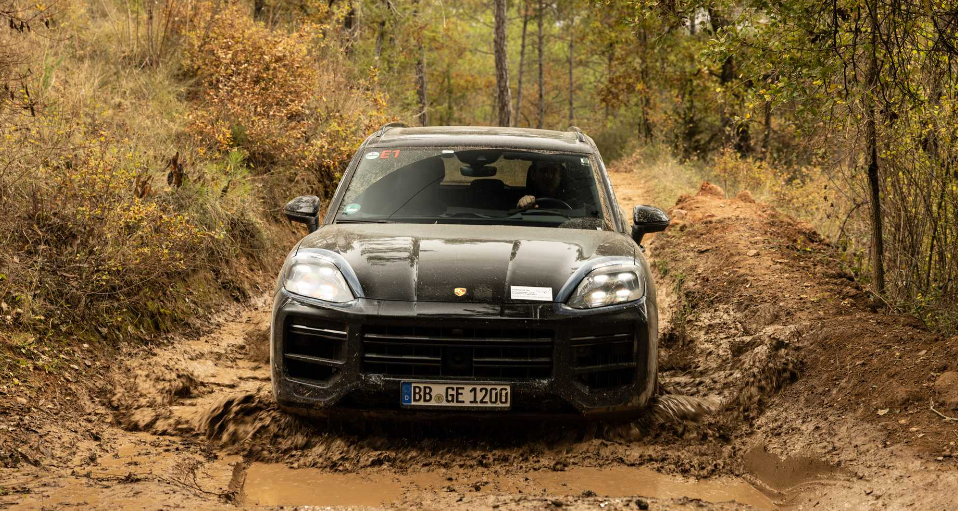The speculation that Porsche will provide an electric version of the Cayenne by the year 2026 has been confirmed, and the company has provided a timeframe for its aggressive push to produce 80 percent of its annual sales in the form of electric vehicles by the year 2030.

Despite recent difficulties with chip supply, the German automaker’s Taycan electric vehicle (EV) continues to operate well. However, during the next three years, the Taycan will be replaced by a family of Porsche EVs that are radically different from one another. If the Cariad software business of VW Group hadn’t made such a monumental error, the Macan electric vehicle was supposed to go on sale in 2019, instead it won’t be available until 2024. Although it is built on an entirely distinct PPE platform that was developed especially for electric vehicles, the electric Macan will be sold alongside the standard combustion Macan models. Both versions will have a strikingly similar appearance.
Next up comes the most audacious of the bunch: an all-electric version of the 718 to succeed both the Boxster and the Cayman. This one will not be marketed alongside combustion models, and it is certain to divide opinion. It was previewed by 2021’s Mission R concept racer, and it will go on sale “for the middle of the decade,” which is expected to translate to the beginning of 2025. We anticipate that the base models will feature a rear-wheel drive layout with a single motor, while the flagship models will include a dual-motor design, which will make this the first Boxster or Cayman with all-wheel drive.
2026 Porsche Cayenne EV Review
Fans of the Porsche brand were outraged when the first Cayenne model was introduced in the year 2003. How does a sport utility vehicle fit in with Porsche’s lineup of sports cars? That it did, and very quickly it rose to become one of the most popular models offered by the firm. The production of the first electric version of the Porsche Cayenne, which is scheduled to begin in 2026, brings the mid-size SUV to yet another crossroads.
We don’t know much about the Cayenne EV just yet, but based on what we do know, we anticipate that it will deliver the same combination of racing thrills and family practicality that helped put Porsche’s first SUV on the map all those years ago. It is anticipated that the battery-powered Cayenne EV will bear more than a passing resemblance to the gas-powered edition, exchanging the smell of fuel and the sounds of the engine for the ability to drive without emitting any pollution. It is currently uncertain which powertrain options will be available, how far the vehicle will travel, or how well it will operate, but we will update this article with new information as soon as we have it.
Range, Charging Capacity, and Battery Life
The official range estimates won’t be available until the Cayenne EV is introduced, but Porsche claims that the electric SUV will have a range comparable to that of the Macan EV (more or less), which, according to the EPA, has a maximum range of 227 miles.
As with the Taycan, Porsche plans to sell two different battery capacities, but considering that the majority of Taycan owners in the United States opted for the variation with a longer range, it is probable that only the larger battery will be imported to the country. This will be the case because Porsche expects to offer two different battery capacities. It is predicted that the Cayenne EV will take advantage of the Taycan’s 800-volt architecture, which makes it possible to do rapid charging at up to 270 kilowatts.
Mileage
Expect a better mpg than the Taycan EV, which is supposed to be more of an enthusiast vehicle, as this vehicle is designed to be more of a practical vehicle. The Taycan’s most economical variation is advertised to reach up to 83 MPGe combined.
The CEO of Porsche, Oliver Blume, stated during the company’s annual press conference that the all-electric fourth-generation Cayenne will not be released until after the all-electric Macan (2024) and the 718 sports car (2025). According to Autocar, the electric version of the Porsche Cayenne is not expected to be available until 2026. It is anticipated that it will arrive on the market before Porsche’s next three-row flagship, which is expected to debut in 2027.
Engine
Not at this moment. The Porsche Cayenne will receive a significant update for the 2024 model year. Autocar anticipates, much like with the Macan, that the combustion model of the Cayenne will continue to be offered alongside the electric vehicle for some time.
Even yet, Porsche anticipates that by the year 2030, combustion vehicles will account for 20% of their total sales. The vast majority of that budget will be allocated to 911, which accounted for approximately 13% of Porsche’s total sales worldwide in 2022. Although it has not been established for certain, Porsche may have plans to include hybrid or combustion-powered iterations of the Cayenne in the lineup for the year 2030.
Blume referred to the electric vehicle as the Cayenne of the fourth generation. Therefore, it will not be a variant of the third generation that is now in use. According to Autocar, Porsche plans to construct the Cayenne EV on the Premium Platform Electric (PPE) platform developed by VW Group. It will include hardware that can charge at speeds up to 270 kW and operate at 800V. It should also incorporate the technology seen in the Macan, which enables the battery pack to be divided in two and to get a faster charge from 400V chargers.
According to Autocar, the battery pack of the Cayenne EV will have a capacity of 100 kWh. According to the WLTP, the range should be greater than 300 miles (but the EPA has other requirements). According to the article, Porsche may aim to achieve a range comparable to that of the Mercedes EQS SUV, which delivers 305 miles in its base configuration.
The electric Cayenne ought to be a dual-motor all-wheel-drive vehicle. For the top version of the Cayenne EV, a power output of at least 603 horsepower and 738 pound-feet of torque should be the bare minimum we expect from Porsche. However, we would be shocked if the company did not strive to outdo the 631 horsepower produced by the existing Cayenne Turbo GT.
Interior
It is expected that the cabin of the Cayenne EV will be completely redesigned, with the Macan EV serving as a source of inspiration along with other elements that are fresh new to Porsche. However, we do not anticipate an interior with a high proportion of digital components similar to those of Tesla’s Model X. The new configuration will make use of the model’s specialized electric platform, which will result in the vehicle having more space and usefulness than its predecessor that was fueled by gas.
It’s possible that the middle-seat passenger in the Cayenne Electric has much more legroom and comfort thanks to the flat floor. We are anticipating an increase in the amount of storage space located between the front seats. It would be fantastic if Porsche could provide an option for a floating or adjustable center console, which would free up a substantial amount of storage space between the front seats and be large enough to accommodate many shopping or grocery bags. There is a possibility that Porsche will incorporate a few newly developed environmentally friendly materials. These materials may be recycled, upcycled, or at the very least comprise resources that do not result in any unnecessary waste or pollution during the manufacturing process.

The electronic components of the Porsche Cayenne EV will be powered by CARIAD’s newest software platform, which goes by the name “E3 1.2.” The new software stack will make it possible to provide enhanced over-the-air update operations in addition to new connectivity and help features. The new application marketplace that CARIAD and HARMAN are working together to build for use across all Volkswagen Group brands will be incorporated into the infotainment system.
You may rest easy knowing that the appearance and operation of the app store in the Cayenne EV’s unit will be identical to that of a Porsche. This app store allows users to integrate third-party applications like Spotify, Yelp, The Weather Channel, Webex by CISCO, and TikTok into their devices.
2026 Porsche Cayenne EV Price & Release Date
It has been confirmed by Porsche that the manufacturing of the all-electric Cayenne will take place at the Volkswagen facility in Bratislava, which is located in Slovakia. The Volkswagen E-up is manufactured in Slovakia at the facility., but the next-generation Porsche Cayenne will be the company’s first electrified sport utility vehicle (SUV). On the other hand, the Porsche Leipzig facility will be responsible for the production of the entry-level Porsche Macan Electric and the premium Porsche K1 SUV vehicles.
It is possible that the first production model of the all-electric Cayenne, which will compete with the Range Rover Sports EV, may debut in the year 2025. The Cayenne is a very profitable model for Porsche and makes a considerable contribution to the company’s overall sales. 95,604 units were shipped globally in 2022, making it Porsche’s best-selling model.

At the Annual Press Conference, Blume stated, “The Cayenne has conquered the sporty SUV segment over the past 20 years – as a family-friendly tourer, a robust off-roader, and a highly dynamic sports car all rolled into one,” “The all-electric Cayenne shall continue this success story,” the CEO stated afterward.
The E3 1.2 platform is a next-generation universal software platform and related hardware architecture, both of which Porsche hopes to utilize in the Cayenne EV. However, Porsche is currently experiencing setbacks in the development of the E3 1.2 platform. These problems in software development could postpone the production of the Cayenne EV. Because of this issue, the business has already been forced to postpone the beginning of manufacturing of the Macan EV.